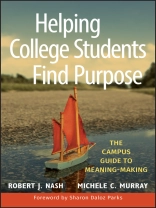Helping College Students Find Purpose
Today’s college students are demanding that their educational experiences address the core questions of meaning and purpose. . . What does it mean to be successful? How will I know what type of career is best for me? Why do I hurt so much when a relationship ends? Why do innocent people have to suffer?
Faculty and administrators are in the unique position to make special contributions to their students’ search for meaning, and when they work together, everyone on a college campus benefits. Helping College Students Find Purpose provides a theory-to-practice model of meaning-making that enables the entire campus community to participate in the process. Based on a practical how-to approach, the authors outline a series of concrete steps for applying the theory and practice of meaning-making to teaching, leading, administering, and advising.
Filled with real-life vignettes, this guidebook includes the background knowledge and proven tools that will help faculty and administrators act as effective mentors to students. While there is no single solution that can meet everyone’s needs, the authors provide a series of classroom and cross-campus strategies that are specifically designed to help students successfully navigate their diverse meaning-making activities and effectively enhance their quest for meaning.
表中的内容
Foreword vii
Preface xiii
About the Authors xxxi
Part I: Making Meaning in the Quarterlife 1
1. Is the Quarterlife Generation Ready for Meaning-Making? 3
2. Exploring the Meaning of Meaning: Existentialism and Postmodernism 27
3. Finding Meaning in Religion and Spirituality: Why Can’t My Faith Be Cool? 51
Part II: Putting Meaning-Making to Work: Tools of the Trade 85
4. A Pedagogy of Constructivism: Deep-Meaning Learning 87
5. Make Room for Meaning: Practical Advice 127
6. The Ethics of Meaning-Making 161
7. Meaning Maxims for Both Inside and Outside the Classroom 179
Part III: Our Own Attempts to Make Meaning 203
8. Two Personal Reflections for Our Readers 205
Resources for Meaning-Making Educators 237
Resource A: Four Therapeutic Approaches to Meaning-Making 239
Resource B: Crossover Pedagogy 277
References 299
Index 309
关于作者
The Authors
Robert J. Nash is an Official University Scholar in the Social Sciences and Humanities at the University of Vermont, Burlington, and has been a professor in the College of Education and Social Services there for forty years. He is the 2009 recipient of the Joseph A. Abruscato Award for Excellence in Research and Scholarship there. A prolific writer, he has published ten books, including How To Talk About Hot Topics on Campus from Jossey-Bass, as well as more than one hundred articles, book chapters, monographs, and book reviews in many of the leading journals in education at all levels.
Michele C. Murray is the associate vice president for student development at Seattle University. She provides leadership for engaging students in cocurricular activities that enhance their intellectual, spiritual, and emotional development. In addition, she supervises departments that facilitate student involvement, including New Student and Parent Programs, Leadership Development, Commuter and Transfer Student Services, Office of Multicultural Affairs, and Student Activities.












